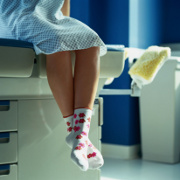 Photo: Getty Images
Photo: Getty Images
In the past 30 years, cervical cancer rates in the United States have fallen by more than half, experts say the decrease is mainly due to the widespread use of cervical cancer screening and Pap smear tests.
This year, the American Congress of Obstetricians and Gynecologists (ACOG) changed their recommendations for Pap smears. ACOG’s main guideline change is the recommendation of the first Pap smear to be performed on health women starting at age 21. ACOG’s former recommendation was obtaining the first Pap smear at either three years after a woman became sexually active or age 21 (which ever occurred first).
Some experts believe Pap smears in women under 21 do more harm than good.
A Pap smear, also known as Pap test, checks for abnormal cell changes of the cervix. A Pap smear can identify unhealthy cervical cells, cervical cancer and infection. If a Pap smear shows abnormal results, Doctors usually do a small biopsy of the cervix. Also, doctors will monitor the young women more closely if she has abnormal cells.
In an interview with Reuters Health, Dr. Mark Einstein of the Albert Einstein College of Medicine, Bronx, New York, stated that in most cases such tests reveal only human papillomavirus (HPV) infections, which rarely lead to cervical cancer in women under 21.
According to the Centers for Disease Control and Prevention, about 20 million Americans currently are infected with HPV. HPV is the most common sexually transmitted disease in the world.
Einstein, an ACOG fellow, said, "They have a better chance of winning the lottery than getting cancer at that age." Einstein also stated, "Over-screening adolescents is really detrimental to young women. We increase their anxiety; we increase their time away from school and work."
Additional new guidelines, published in the journal Obstetrics & Gynecology, include:
• Women should have their first screening Pap smear at age 21 unless the woman has had a previous abnormal Pap smear
• Women in their 20’s should have a Pap smear every two years (assuming prior Pap smears have been normal)
• Women age 30 and older who have had three consecutive normal Pap smears should have a Pap smear every three years
• Women who have had a hysterectomy for non-cancerous reasons do not need a Pap smear unless they have a cervix
• These guidelines need to be followed whether you have or have not had the HPV vaccine
The American College of Obstetricians and Gynecologists (ACOG) also recommends that adolescents with compromised immune systems (due to HIV infections, organ transplants or long-term steroid use, etc.) should not wait until 21 for their first Pap smear.
According to Einstein, although this group makes up less than one percent of adolescents, their weak immune systems may allow HPV to develop into cancer much more easily than in healthy individuals.
Sources:
http://www.acog.org/acog_districts/dist_notice.cfm?recno=13&bulletin=3161
http://www.womenshealth.gov/faq/pap-test.cfm
http://www.reuters.com/article/idUSTRE66K6AG20100721
http://www.niu.edu/healthservices/images/Pap%20Smear%20Guidelines%20Handout.pdf
http://open.salon.com/blog/davis_liu_md/2010/07/26/new_pap_smear_guidelines_-_rationing_healthcare_or_the_right_care





Add a Comment2 Comments
Hi, i am 16 and a virgin, but my mom is making me go get one. i dont know what to do because i dont want one. what do i need to do? my mom and doctor will be in the same room. my doctor is 70-80 something years old, so will she know about the new guidelines? if she does know, will she tell my mom to wait til im 21? help me please and thank you very much!!
May 29, 2012 - 9:36pmThis Comment
Thanks for this helpful article. You did, however, miss one of ACOG's key recommendations for cervical cancer screening for women age 30 and older: HPV testing. HPV is the primary cause of cervical cancer. HPV itself is very very common, but there are a select number of high-risk HPV types that are associated with cervical disease. HPV testing enables doctors to detect these high-risk HPV infections and monitor/follow-up with women so that cervical cell changes can be caught early and never have the chance to develop into cervical cancer. HPV testing is recommended in the new guidelines you reference for women age 30 and older together with their Pap. And, of course, there is HPV vaccination available for young girls.
December 17, 2010 - 8:56amThis Comment